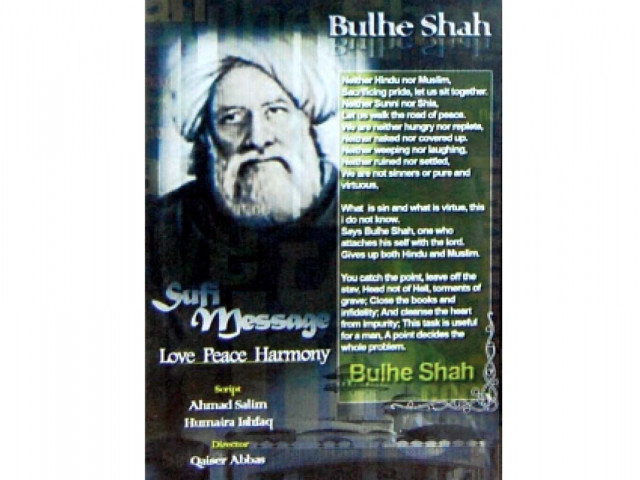Understanding Sufism: Mystic tradition that most are not really aware of
SDPI screens documentaries on two prominent Sufi figures.

Though Sufism has been raised to an iconic status in the East, most individuals aren’t familiar with its depth and history.
This was the consensus among speakers who had gathered for screening of documentaries at the Sustainable Development Policy Institute on Monday.
The event featured two 14-minute documentaries on the lives and contributions of two of the most prominent mystics from the Sufi tradition - Bulleh Shah and Shah Shams Sabzwari.
Each documentary, though brief, was educational and aesthetically pleasing to watch, showing where these figures arose, how their timing shaped their work, and the impact they have left on people.
Extensive use of spiritual music by Abida Parveen and Arieb Azhar, juxtaposed with other folk musicians, have conveyed the far-reaching influence of both figures, said a participant.
Some of the viewers said they conflated Shah and Sabzwari prior to the screening, and now know that the former belongs to the 16th Century while the latter preceded him in the 12th Century.
These comments proved a testament to the pressing need of a richer understanding of the history of Sufi thought.
The documentaries’ scriptwriter and SDPI Senior Adviser Ahmed Saleem noted that though all mystics promoted peace but the context and manner in which they made contributions was varied.
Islamic Research Institute Director General Muhammad Khalid Masud said though Sufi thought has helped the modern world by being emblematic of peace and tolerance, we need to understand Sufism completely rather than selectively.
Moreover, he said if we are to assure that Sufism doesn’t become an empty symbol of peace, it is more imperative than ever to understand its evolution.
He further explained that Sufism first began to achieve spiritual fulfilment and harmony during the Mughal era, when it was used either for support or denunciation of the “raj”.
After colonialism, it became a force that respected and elevated every human being, irrespective of religion, caste or race.
Humaira Ishfaq, a post-graduate teacher of Urdu literature, said due to lack of understanding of the chronology and classifications of Sufism, many have misconceptions that intoxication is a predominant tenet of Sufism.
She noted that while a category of mystics have used intoxicants as a crutch for spirituality, this is not a practice condoned by the tradition.
The documentaries are available on the institute’s website, while their
DVDs can be requested from SDPI.
Published in The Express Tribune, November 13th, 2012.



1724319076-0/Untitled-design-(5)1724319076-0-208x130.webp)















COMMENTS
Comments are moderated and generally will be posted if they are on-topic and not abusive.
For more information, please see our Comments FAQ